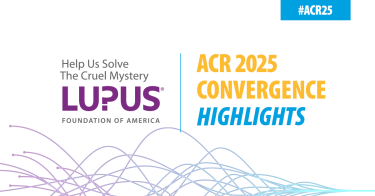
This year the annual American College of Rheumatology (ACR) Convergence meeting took place in Chicago, IL from October 24 – 29, 2025. Each year the conference showcases the latest in cutting-edge lupus research and treatment. Bringing together scientists, clinicians, advocates and people living with lupus, the community shared the latest developments and innovations in lupus research aimed at improving the lives of people with lupus.
The Lupus Foundation of America (LFA) proudly presented eight abstracts and sessions during this year’s convergence with the goal of advancing science, improving care, and amplifying the diverse voices of people with lupus. Highlights from across this year’s event included updates to ACR’s systemic lupus erythematosus (SLE) treatment guidelines, promising study results from emerging therapies, groundbreaking CAR T-cell research, new tools that strengthen patient-provider communication, and ongoing efforts to increase representation in clinical trials.
Our Inside Lupus Research team covered this year’s research highlights from the conference. Read more below.
Systemic Lupus Erythematosus
A featured panel during the conference focused on the new ACR Guidelines for the treatment and management of Systemic Lupus Erythematosus (SLE). The full guidelines, expected to be released in the coming weeks, provide an update from the 1999 guidelines when disease management was limited to a small number of available therapies and disease understanding was not as advanced.
The panel discussed the guideline summary, previously released in May, including the 36 recommendations. The panel also highlighted organ-specific disease recommendations and special considerations for adolescents and children with SLE. Additionally, the guidelines encouraged doctor and patient shared decision making due to the heterogeneity of the disease. Learn more in our full write-up from the discussion.
Lupus Treatment News
- Dapirolizumab pegol (DZP) – In a Phase III trial, LFA Medical-Scientific Advisor Dr. Joan Merrill and Medical-Scientific Advisory Council (MSAC) member Dr. Zahi Touma presented findings that show DZP significantly improved fatigue, musculoskeletal pain and morning stiffness, offering encouraging progress toward better quality of life for people with lupus.
- Obinutuzumab – In a secondary analysis of the Phase III REGENCY trial co-authored by the collaborators Dr. Richard Furie and LFA MSAC Chair Dr. Brad Rovin, as well as Dr. Amit Saxena, obinutuzumab improved kidney outcomes and demonstrated steroid-sparing benefits for people with lupus nephritis. On October 20 the drug received FDA approval for the treatment of adults with lupus nephritis.
- Cenerimod – MSAC member Dr. Anca Askanase co-authored a Phase 2bstudy that found that cenerimod 4 mg improved alopecia and mucosal ulcers over six months, signaling potential for meaningful relief of symptoms often overlooked in lupus care.
- Deucravacitinib – In a Phase II study, deucravacitinib reduced biomarkers linked to kidney dysfunction, suggesting the therapy may help protect renal health in lupus and support long-term disease management. Results were presented by the LFA’s MSAC Chair Dr. Brad Rovin and MSAC member Dr. Zahi Touma, as well as Dr. Amit Saxena.
CAR T-Cell Therapy
CAR-T cell therapy continues to be one of the most promising areas of lupus research. Findings presented at ACR 2025 show growing evidence that CAR T-cell therapy may lead to deep, sustained remission and may represent a future transformative approach for people with severe lupus who do not respond to standard treatments.
- BMS-986353 (CC-97540) – The LFA’s MSAC member Dr. Anca Askanase with Dr. Amit Saxena collaborated on the the Phase I Breakfree-1 trial which showed that this next-generation CD19 CAR T-cell therapy achieved major reductions in disease activity with a manageable safety profile in people with severe lupus.
- YTB323 (Rapcabtagene Autoleucel) – In research presented by 2022 LFA Evelyn V. Hess Award recipient Dr. Eric Morand, interim results from an open-label Phase 1/2 study, revealed complete B-cell depletion and repopulation with healthy naïve B Cells, supporting the concept of an immune “reset” for people with severe refractory lupus.
In a study presented by the LFA’s Director of Research, Dr. Michael Fisher, a focus group with people living with lupus explored attitudes toward CAR T-cell therapy trials, specifically the FT819 product. The conversations revealed both barriers and motivators for clinical trial participation, offering valuable insights that will help researchers design future trials where participants feel informed and supported.
Patient-Provider Communication
Strong communication between people with lupus and their healthcare providers is key to better disease management and health outcomes. Several LFA-supported studies at ACR 2025 explored how digital tools and technology can strengthen these important connections.
The LFA’s self-management app, Strategies to Embrace Living with Lupus Fearlessly (SELF), was at the center of a study presented by LFA’s Melissa French, on how incentives can boost participation. By promoting the app through targeted social media campaigns, more than 1,700 new users joined the program and overall engagement grew significantly. These results show how simple strategies can encourage people to explore tools that improve self-management skills and strengthen communication with providers.
A study of the LFA’s Lupus & You: Answers. Advocacy. Action virtual education series also took center stage. Over the past four years, the program has seen registration grow to more than 20,000 people. The study presented at ACR by LFA’s Ashley Holden demonstrates how vital accessible education remains and how virtual platforms can bring reliable lupus information to anyone, anywhere.
One study showcased the creation of an electronic health record lupus dashboard designed to identify patients who are overdue for visits or lab tests. The study led by LFA’s MSAC member Dr. Christie Bartels and included LFA’s Dr. Joy Buie discussed how the dashboard generates personalized reminders and outreach, helping ensure that people with lupus stay connected to the care they need. This model, adapted from a proven HIV Care Continuum model, has the potential to close care gaps and set a new standard for proactive lupus management.
Increasing Representation in Clinical Trials
For lupus research to serve everyone affected by the disease, clinical trials must include people from all ethnic backgrounds. At ACR Convergence 2025, the LFA showcased several efforts that bring us closer to that goal.
LFA’s Safoah Agyemang presented a poster on a study looking closely at racial representation in the LFA’s Research Accelerated by You (RAY) patient registry. Black/African American individuals are disproportionately affected by lupus, and their representation is important. Through interviews and group discussions, Black/African American individuals shared what matters most when considering involvement in research. Trust, clear communication from healthcare providers, and culturally relevant messages all emerged as essential to making clinical studies more inclusive.
Additionally, LFA’s Wendy Rodgers also shared the positive impact of the Lupus Sister Circle, a virtual support group for Black/African American women offered by the LFA. Since its launch in 2021, the group has provided a welcoming space for connection, and survey results show very high satisfaction. By creating opportunities tailored to the needs of specific communities, quality of life and engagement in lupus research can be improved.
The Lupus Foundation of America is energized by the progress shared at ACR Convergence 2025 and grateful to the researchers, clinicians, people with lupus, and partners who make it possible. Each study and presentation moves us closer to ending lupus!
This post was originally published on this site
